The Mill That Ground Out Silver Coins
Reading Time: 10 min
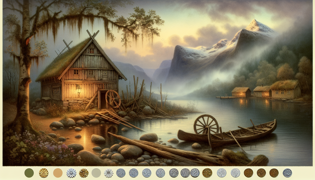
About Story: Mill that Ground Out Silver Coins is a from norway set in the . This tale explores themes of and is suitable for . It offers insights. A Norwegian folktale about a spirited protagonist who discovers a magical mill that grinds out silver coins, leading to humorous adventures and clever antics.
Introduction
On a brisk autumn morning, the air scented of pine needles and woodsmoke, young Runa set off for the old mill by the fjord. Her boots squelched over moss and frost, and the distant hoot of an owl echoed like a secret in the pines. She had heard whispers of an ancient grinding stone, said to turn barley into fine meal, but something even stranger lingered in hushed tavern tales. Some claimed it spat out silver coins instead of flour.
Runa, restless as a hummingbird, felt her curiosity prickle her skin. She crept beneath the oak beams of the crumbling mill, where the wheel stood motionless, coated in emerald lichen. Water trickled in from the mountains, a gentle susurration against dark stone. She pressed her palm to the millstone—cool and rough like a ship’s hull. Then she whispered the words old farmers dared not speak: “By the grace of fjord and fire, grind for me a token of treasure.”
A sizzling hush filled the air, broken by the sudden churn of gears and creaking wood. Silver dust flared like starlight as the stone spun. Clink! Clink! A neat pile of coins tumbled into a wooden trough. Runa’s breath hitched, mingling with the tang of damp earth. She scooped up the shining bounty, its chill biting her fingers like fresh snowfall. The possibilities stretched before her like a road unrolled under midnight skies.
Yet deep in her heart, she wondered: what could go awry when desire and magic danced together? With a grin, she knew she’d soon find out.
Discovery by the Fjord
Runa returned to her village with pockets heavy enough to rattle like distant thunder. Each silver coin felt firm as an eagle’s claw, and she cradled them against the damp wool of her cloak. The scent of salt spray clung to her cloak’s hem as she recounted the mill’s magic to anyone who would listen. Old Maren the baker nearly tossed her bannock into the fire at the very notion, muttering it was “det er som å finne en nål i en høystakk”—a dutiful reminder that impossible things sometimes happen.
Yet that evening, beneath flickering hearth flame, Runa resolved to test the mill further. She slipped from her home, the floorboards whispering like wary mice under her tread. Outside, a breeze skimmed the fjord’s surface, carrying a faint hint of kelp and driftwood. The moon was a silver sickle overhead, as if winked on by the same conjuration that powered the mill.
She measured out fine barley, dressed it in a linen sack scented with juniper, then uttered the old chant. The wheel sprang to life with a groan like an ancient oak waking from slumber. Sparks of magic danced on the stone, as if fireflies had been trapped within. The thrum of grinding drowned out the soft lap of water.
Minutes later, a cascade of coins fell into the trough. Runa scooped them up, the metal gleaming like fallen stars. Yet as she did, a tremor thrummed through the earth. The ground vibrated with a low hiss, reminiscent of trolls stirring beneath distant boulders. She glanced around. The once-still pines now rustled in warning.
Heart bobbing like a boat on choppy seas, Runa realised that with such power came peril. Greed might draw near, hungry as a winter wolf. But she was quick-witted—Å ta tyren ved hornene, to seize the bull by its horns. And so her grand caper truly began.
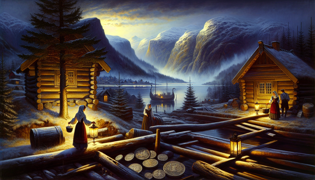
The First Flour Mill Mischief
Word of Runa’s windfall spread through the village like wildfire fanned by a gale. Soon, local merchants offered her barrels of grain for a share of the silver. She feigned reluctance, her lips curving in a sly smile as she accepted only enough to keep her secret safe. Each morning, she took sacks of barley down the fog-laden lane, the air rich with peat smoke and the murmur of waking gulls.
Inside the forgotten mill, she experimented with different grains—rye, oats, even wild millet gleaned from abandoned fields. To her delight, every variant yielded silver coins stamped with curious runes. They felt cool, as crisp as autumn’s first frost. Each pile clinked in her pouch like laughter.
One damp dawn, the mill’s wheel spun so fiercely that the wooden gears groaned in protest. A metallic scent hung heavy, like the tang of blood before a storm. Runa prised open the chute and peered in. There, wedged between iron teeth, glittered a coin unlike the rest—engraved with a snarling wolf and a crown of oak leaves.
She pocketed it, unaware that the mill’s enchantment had begun to shift. For every bag of grain she ground, whispers flickered through its stones. A hungry hunger for silver settled in its core, dulling the harmony of water and wood. The trickle that once crooned like a lullaby now boomed against the chamber walls.
When she emerged, a pair of ragged travellers loitered at the gate. Their eyes glowed with avarice, slick as eels. “Girl,” rasped one, “we’ve heard tell of a mill that makes silver. Lead us there, and we’ll share our spoils.” The other spat into the mud. Runa’s pulse rattled her ribs. She pressed a finger to her lips. Deception would serve her still.
She invited them to supper, the kitchen warm with stew and the tang of pickled herring. Outside, rain tapped a playful rhythm on the roof tiles. As they dipped bread into the broth, she spun tales of a broken wheel and cursed waters. Their greed turned sour, faces twisting like spoiled fruit. When dawn broke, they stumbled off, empty-handed and muttering dark curses.
Runa’s laughter rang clear as church bells—she had outwitted them. Yet the mill’s appetite gnawed at her conscience, reminding her that cleverness must be tempered with care.
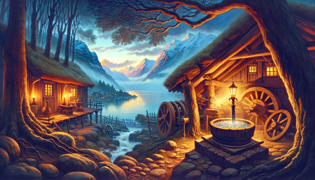
Trouble in the Market Town
With pockets full of silver, Runa ventured to the market town of Brynheim. Timber‑framed stalls lined muddy lanes, their wares strewn like jewels on velvet cloth. The aroma of spiced apples mingled with the clang of blacksmiths hammering iron—each strike echoing like distant thunder. She felt both thrill and dread, for townsfolk were as sharp as trout in the river when wealth was near.
She purchased seeds for winter crops and a bolt of crimson wool for her mother’s shawl. Each merchant pressed her for more silver, eyes shining like the coins themselves. One burly trader tried to palm a handful while her back was turned, the gold clinking soft as prayer beads. Runa caught his sleeve and flashed her thinnest grin. “Mind your manners,” she said, voice cool as glacier water. He stammered an apology and shuffled off, leaving her to parley in peace.
Midday sun hollered across the square. A band of city guards, their breastplates glinting like fresh snow, approached the stalls with stern faces. Whispers spread: they searched for a magical hoard upsetting the realm’s economy. Runa’s heart beat wild as a startled deer. She clutched her pouch, the leather supple and warm beneath her cloak.
Thinking quickly, she dipped into an alley scented of damp straw. Faint strains of a travelling fiddler drifted from a tavern door, weaving through the crisp air. She slipped inside, ordering spiced ale, and watched the guards parade past. They barked at vendors and inspected stalls, but she remained hidden behind a barrel of smoked salmon, its smell briny and bold.
After they left, she slipped back to her merchant friends. Using a few coins, she bribed a raucous juggler to draw attention, creating a spectacle of flaming torches and juggling knives. The crowd cheered and cheered until the guards were lost in the throng. Runa slipped away with her pouch still jingling like the chime of chapel bells.
That eve, back at the mill, she pondered how easily greed and law entwined around magic. Her laughter softened by twilight, she recognised that fortune’s wheel was as unpredictable as the sea’s tides.
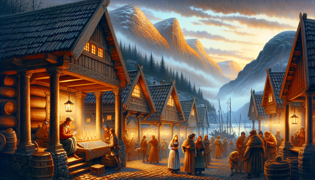
The Clever Escape
The next morning, Runa sensed a shift in the mill’s heartbeat. Water spilled louder, as though furious at being confined. A metallic haze hovered above the chute, shimmering like northern lights trapped in glass. She poked at the runic coin with a finger—it felt unnaturally hot, humming beneath her touch.
Suddenly, the millstones lurched. The wheel spun backwards, hurling sparks that smelled of sulphur into the dank air. Every grain she had left, whole sacks of barley and oats, turned to raw silver dust. It sifted through the floorboards, swirling into the rafters like ghosts of winter. Runa leapt back, her heart pounding like a landslide. The churn of enchantment had gone too far.
She threw her cloak over the opening and dashed outside. Rain lashed her face, salty and cold. The mill groaned as if in agony; wooden beams splintered under the pressure. She realised she must break the runic wolf coin to halt the grinding curse. But the coin sat locked inside the mill’s belly, and the gates were fastened by iron bars.
She raced to the smithy where old Torvald hammered ploughshares by the glow of coals. The forge hissed, hot embers crackling like restless sprites. “Help me!” she gasped, thrusting splintered wood and the half-smoked barley. He recognised the urgency ringing in her voice. With swift strokes, he pried open the mill gate. They dashed in together, boots clattering against the stone floor.
Inside, the wind of magic whirled about them. Runa searched for the stone wolf’s lair. She spotted it wedged between iron teeth, glowing fiercely. With Torvald’s hammer, she smashed it in two. A deafening crack roared, then silence fell like the last leaf in autumn.
The stones slowed, the wheel stilled, and the air cleared of sulphur. Rhythmic dripping was all that remained. Runa sank to her knees, breathless as a wounded swan.
Later, under moonlit calm, she and Torvald patched the mill’s wheel. She remembered Alle gode ting er tre—all good things come in threes. She let the old magic rest.
As dawn painted the peaks pink, Runa slipped away, her pockets still jingling with a modest hoard of silver. She had outwitted greed, saved her village from collapse, and learned that even a playful heart must heed the price of enchantment.
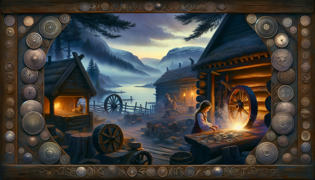
Conclusion
Months passed, and the mill returned to silent service, grinding only grain for the villagers. Runa visited now and then, leaving baskets of oats and wild berries at its door. The memory of silver lingered like the aftertaste of sweet licquer, a reminder of her daring. In the hearthlight of her home, she recounted the adventures to wide‑eyed children, weaving lessons of temperance into each retelling.
She’d kept a single silver coin—plain and unmarked—tucked away in her mother’s wooden sewing box. It sat there, cool to the touch, a quiet testament to what can happen when curiosity meets courage. She never sought the mill’s magic again. Better to allow wonder to rest, she thought, like a winter stream beneath ice.
Occasionally, traders still whispered of a phantom mill that once churned wealth from barley. Some ventured down the fjord in search of gold. None found the secret wheel, for its doors remained locked by friendship and shared laughter rather than iron. The villagers spoke of Runa with affectionate pride, mumbling that she’d shown them how to outwit both trolls and merchants.
In the end, the greatest treasure was the tale itself—passed from hearth to hearth, as warming as fresh-baked bread. And though silver brought excitement, it was her wit and kindness that minted the real magic. Runa learned that a crafty mind and a true heart could weather any storm, and that folklore grows richer when shared under starry skies.

















